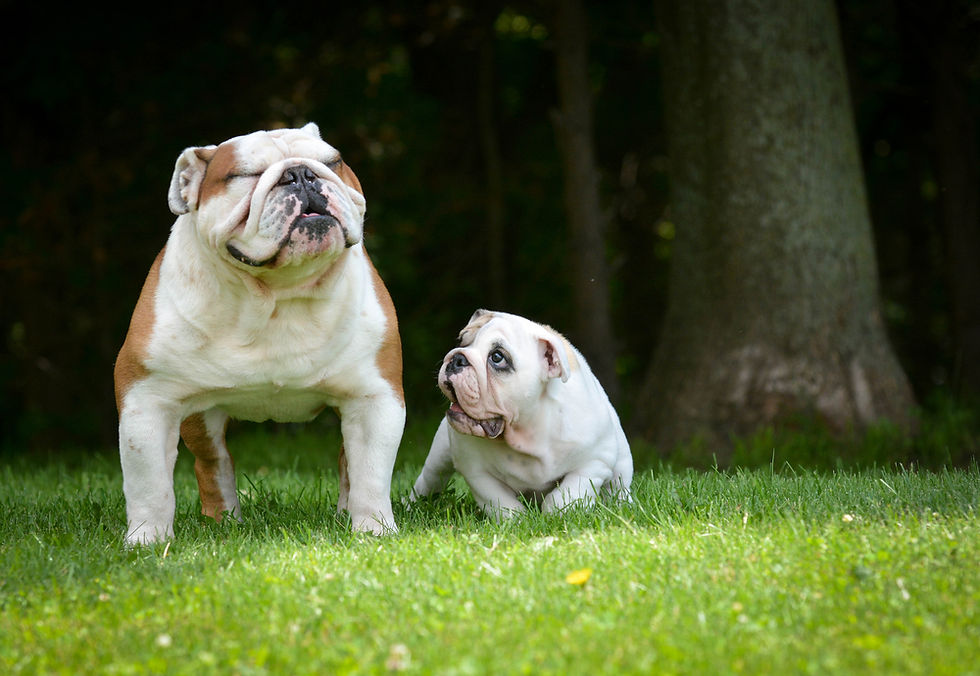
Just like humans, puppies and dogs go through physical and psychological development stages. With all dogs being unique, there is no one-fits-all development timeline. Genetics, breed, size, de-sexing and breeder intervention can all play a part in when a development stage will commence and how long it can last.
We discuss some different development stages, both physical and psychological and share information on what to expect throughout their journey into adulthood.
8-16 Weeks
During this period, puppies are being welcomed into their new homes and your puppy’s social development will be occurring. It is at this time that socialisation should be your primary focus and commence with exposure to new sights, sounds, environments and weather conditions. Positive experiences in new environments and new people will build your puppy’s confidence in varying situations and will set your dog up for success in the future.
It is imperative to note that each socialisation experience needs to be positive. Failure to protect your puppy from negative socialisation and environmental exposure can lead to behavioural and psychological problems later in life.
During this time, you should;
- Expose your dog to new people
- Expose your dog to new sounds
- Exposure your dog to new places
- Exposure your dog to household items (i.e. vacuums, brooms)
- Participate in healthy and positive socialisation with other dogs in a safe environment
Note: Reward your dog when he displays confident, inquisitive behaviour. Pandering to or comforting a frightened puppy will reinforce anxious behaviour and can result in phobias, anxiety, fear and potentially aggressive behaviours around unfamiliar dogs and people.
During this time, your dog may not be completely vaccinated and thus may not be immune to common diseases like Parvovirus. Ensure that socialisation and introduction to new experiences are done in a controlled manner and do not occur in high dog traffic places like dog beaches or dog parks.
16-22 Weeks (4-6 months)
During this time, your puppy will start teething which means that their puppy teeth will be coming out as their adult teeth come through. Like humans, teething can be an uncomfortable time in life and thus they will begin to chew which is a natural instinct to help soothe and aid the process.
It is important during this time that you only allow your puppy access to appropriate items or toys and quickly discourage any undesirable chewing or biting before it becomes a learned behaviour, habit or worse.
6-12 Months
Your puppy will be reaching sexual maturity. Females will often come into their first season and males will have testosterone production begin. Many people believe that hormones change a dogs temperament and personality however after many years of research they are starting to find what we have already known that de-sexing doesn’t change a dogs behaviour and temperament.
Many breeders are now recommending that de-sexing only occur once a dog is fully grown and developed as the hormones are necessary to ensure correct physical development such as ligaments and growth plates.
6-14 Months
During this time, your adolescent dog may experience a Second Fear Imprint Period. You may notice that for a short period, your dog will be particularly wary. Due to hormonal changes the dogs behaviour will change and it may show fear to new situations. It is important that through the course of your dogs life, you need to be mindful of situations, people and other dogs that may frighten or threaten your dog particularly during this time as one negative experience can have a lasting impact.
18 Months - 2 years
Your puppy is now reaching the period in its life where it is at the most physically and mentally fit. It will now consider itself an adult and at times may challenge and push boundaries it no longer feels bound to obey. If you remain consistent with your training through this period your dog will often cease to challenge leaders. It is often a period where owners may struggle with their once well trained dogs doing some things out of the ordinary to see if they are able to succeed now they are in the prime of their lives.
2 years - 5 years
Your dog will remain in the prime of its life during these years. (provided there is no health concerns)
5 years - 8 years
They are now a mature adult and will start to slow down in many cases as they get closer to senior years. As they develop and age faster than we do they are still generally very fit and active during this time of their lives.
8 years +
Your dog is now considered a senior citizen. Often health concerns will start to display themselves as arthritis, cataracts, deafness, and even doggie dementia can start to form. Time for your friend to take it easy and enjoy the ride.


Commentaires